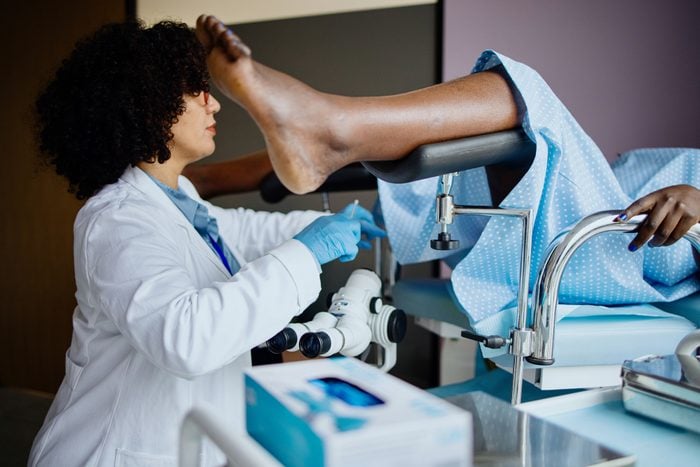
As you enter the doctor’s office, you might feel a bit apprehensive. After all, appointments with an obstetrician-gynecologist (OB/GYN) can be intimate, personal, and sometimes anxiety-inducing.
But remember, an OB/GYN’s primary role is to ensure your reproductive health and well-being—and there are a few key indicators they look for to gauge how you’re doing. We asked OB/GYNs: “What are the first things you notice about your patients?” Here’s what their answers mean for your reproductive health.
Doctors Share What to Know About the New Changes for Breast Cancer Screenings

1. Your general health and lifestyle
From the moment you walk into your OB/GYN’s office, an evaluation of your health and lifestyle begins. This assessment paints a comprehensive picture of your overall well-being, including your physical appearance, energy levels, and disposition.
The state of your physical fitness and energy levels can be a telling reflection of your lifestyle. For instance, if you come across as lethargic, it might hint at inadequate sleep or high stress levels, which can adversely affect your hormonal balance and reproductive health. In contrast, a lively demeanor and bright eyes might be signs that you’re engaging in regular physical activity and getting enough rest.
Beyond visual assessments, your OB/GYN will delve into your lifestyle habits. They’ll want to know about your exercise regimen, dietary choices, and substance use, such as alcohol and tobacco. These elements can profoundly influence your reproductive health. For instance, extreme exercise or overly restrictive diets may throw your menstrual cycle off balance, while chronic stress can lead to hormonal imbalances. Furthermore, habits like smoking and heavy alcohol consumption can harm fertility and pregnancy.

2. Your menstrual cycle
Your menstrual cycle can reveal a lot about your hormonal health. Your OB/GYN will inquire about your cycle’s timing, duration, and regularity, but they’ll also look for visible signs like bloating, mood swings, or skin changes. These observations help identify if your cycle is regular, or if there is an underlying hormonal issue.
Additionally, signs of anemia, such as pale skin, fatigue, and shortness of breath, will prompt further testing to uncover the cause and determine an appropriate treatment plan.
4 Rules for Exercise at Every Phase of Your Monthly Cycle, According to a Personal Trainer

3. Your hair, skin, and nails
Your OB/GYN can notice changes in your hair’s thickness, texture, and growth patterns, which can indicate hormonal imbalances. Conditions like polycystic ovarian syndrome (PCOS) or thyroid disorders can lead to thinning hair or excess hair growth in unusual areas.
Similarly, hormonal fluctuations might result in dry skin, brittle nails, or unexpected breakouts. If your doctor spots any such issues, they recommend further testing or refer you to an endocrinologist.

4. Your abdomen
Your OB/GYN will examine your abdomen’s shape, looking for unusual distention or asymmetry. They may also gently press on your abdomen to check for tenderness or masses. These could indicate conditions like ovarian cysts, fibroids, or other gynecological issues that might affect fertility or cause discomfort.

5. Your breast health
Your OB/GYN will observe more than lumps during a breast exam. Size, shape, or symmetry changes could indicate hormonal imbalances or potential breast health concerns.
Additionally, any nipple discharge, inversion, or skin changes could be signs of underlying conditions that need further evaluation.
8 New Breast Cancer Treatments Some Oncologists Are Calling ‘Mind-Blowing’

6. Your vaginal health
Your OB/GYN will be attentive to your vaginal health. They often gather a wealth of information from a routine Pap smear, which is essential for the early detection of cervical cancer and HPV. Signs of discomfort, abnormal discharge, or unusual odor could point to infections like bacterial vaginosis, yeast infection, or sexually transmitted diseases.

7. Your emotional state and support system
Your emotional state often mirrors your hormonal health. If you appear unusually anxious, irritable, or down, your OB/GYN may inquire about your stress levels, sleep patterns, and overall mental well-being. They may consider potential hormonal imbalances contributing to these emotional changes, which could also impact your reproductive health.
Your support system plays a crucial role in your reproductive health. Your OB/GYN will ask about your home life, work responsibilities, and childcare arrangements. A strong support system can reduce stress and foster a nurturing environment for you and your potential children. High stress can disrupt your menstrual cycle and fertility, while a lack of support can affect your emotional well-being during pregnancy and postpartum periods.
I’m a Psychotherapist—Here Are My 5 Keys to Letting Stress Go
The next time you visit your OB/GYN, remember that each interaction is filled with purpose. Dr. Carrie Ann Terrell, a fellow of the American College of Obstetricians and Gynecologists (ACOG), emphasizes that their approach is rooted in openness, honesty, and respect. They strive to listen attentively, provide informed recommendations, and discuss potential risks and benefits to ensure you receive the highest standard of care.
Your doctor is not just checking off routine boxes but is committed to understanding and enhancing your complete reproductive health, down to the smallest detail. This comprehensive approach ensures you receive the most effective and personalized care possible.
- I Ate Ice Cream Every Day for a Week—Here’s What Happened
- These Are the 3 Most Common Dog-Walking Injuries, New Johns Hopkins Study Says
- 5 Ways Alcohol Can Sabotage Your Weight Loss Goals, According to an Obesity Doctor
- Bikini Wax Wisdom from Waxing Specialists: 6 Things You Should Never Do, and 3 You Should
